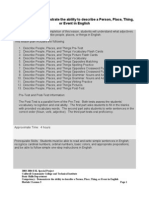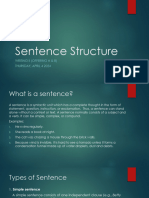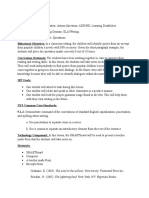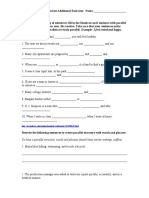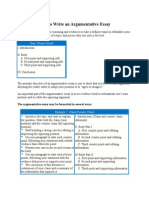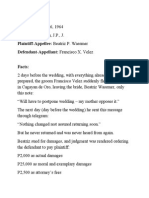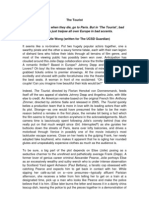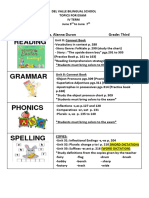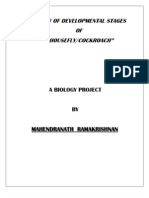Gerunds, Participles and Infinitives - Answers
Gerunds, Participles and Infinitives - Answers
Uploaded by
Cristea AndreeaCopyright:
Available Formats
Gerunds, Participles and Infinitives - Answers
Gerunds, Participles and Infinitives - Answers
Uploaded by
Cristea AndreeaOriginal Description:
Copyright
Available Formats
Share this document
Did you find this document useful?
Is this content inappropriate?
Copyright:
Available Formats
Gerunds, Participles and Infinitives - Answers
Gerunds, Participles and Infinitives - Answers
Uploaded by
Cristea AndreeaCopyright:
Available Formats
Gerunds
Exercise Answers:
Underline the gerunds or gerund phrases in the following
sentences and label how they function in the sentence (subject,
direct object, subject complement, object of preposition).
1. Swimming keeps me in shape. [subject]
2. Swimming in your pool is always fun. [subject]
3. Telling your father was a mistake. [subject]
4. The college recommends sending applications early. [direct
object]
5. He won the game by scoring during the overtime period.
[object of preposition]
6. Her most important achievement was winning the national
championship. [subject complement]
7. Going to work today took all my energy. [subject]
8. Fighting for a losing cause made them depressed. [subject]
Participles
Exercise Answers:
Underline the participial phrase(s) in each of the following
sentences, and draw a line to the noun or pronoun modified.
1. Getting up at five, we got an early start. [modifies we]
2. Facing college standards, the students realized that they
hadn't worked hard enough in high school. [modifies the
students]
3. Statistics reported by the National Education Association
revealed that seventy percent of American colleges offer
remedial English classes emphasizing composition. [1. modifies
statistics; 2. modifies classes]
4. The overloaded car gathered speed slowly. [modifies car]
5. Gathering my courage, I asked for a temporary loan.
[modifies I]
In each of the following sentences, underline the participial
phrase(s), draw a line to the word(s) modified, and punctuate
the sentence correctly. Remember that some sentences may not
need punctuation.
6. Starting out as an army officer, Karen's father was frequently
transferred. [modifies Karen's father]
7. Mrs. Sears, showing more bravery than wisdom, invited thirty
boys and girls to a party. [modifies Mrs. Sears]
8. The student left in charge of the class was unable to keep
order. [modifies student]
9. Applicants must investigate various colleges, learning as much
as possible about them before applying for admission. [modifies
applicants; note that applying for admission is a gerund phrase,
not a participial phrase]
10. The crying boy, angered by the bully, began to fight. [both
modify boy]
Rewrite the following sentences (you may need to reword them
slightly) with the correct placement and punctuation of the
participial phrases.
11. Espousing a conservative point of view the proposal for more
spending on federal social programs bothered him.
The opening participial phrase is misplaced because it is intended
to modify him, not the proposal. A possible revision would be:
Espousing a conservative point of view, he was bothered by the
proposal for more spending on federal social programs.
12. Absorbed in an interesting conversation my scheduled
appointment time passed unnoticed.
The opening participial phrase is dangling because it modifies a
term that doesn't appear in the sentence: I, that is, the person
having the conversation. The "scheduled appointment time"
couldn't have been "absorbed in an interesting conversation." A
possible revision would be: Absorbed in an interesting
conversation, I allowed my scheduled appointment time to pass
unnoticed.
Infinitives
Exercise Answers:
Underline the infinitive phrase and label the way it is used in the
sentence.
1. I want to go. [noun/direct object]
2. I want you to go home. [noun/direct object]
3. We want to see the play. [noun/direct object]
4. To see a shooting star is good luck. [noun/subject]
5. To fight against those odds would be ridiculous.
[noun/subject]
6. To design a new building for them would be challenging.
[noun/subject]
7. I want him to be my bodyguard. [noun/direct object]
8. Jim is expected to program computers at his new job.
[noun/direct object]
9. They will try to build a new stadium in ten years. [noun/direct
object]
10. To distill a quart of moonshine takes two hours.
[noun/subject]
11. The president wants to use nuclear energy for peaceful
purposes. [noun/direct object]
12. She has the money to buy it. [adjective/modifying money]
13. We demonstrated to attract attention to our agenda.
[adverb/modifying demonstrated; note that to our agenda is a
prepositional phrase, not an infinitive phrase]
14. I do not like to give poor grades. [noun/direct object]
15. The dogs were taught to stand, to sit, and to bark on
command. [nouns/direct objects]
16. To be great is to be true to yourself and to the highest
principles of honor. [nouns: 1. subject; 2. subject complement;
note that to yourself and to the highest principles of honor are
both prepositional phrases, not infinitive phrases]
17. To see is to believe. [nouns: 1. subject; 2. subject
complement]
You might also like
- Crochet Snoopy Dog Amigurumi Free PatternDocument5 pagesCrochet Snoopy Dog Amigurumi Free PatternAmanda Daniela100% (8)
- CHECKED Lesson Plan On The Wise Old Woman and Misplaced ModifiersDocument12 pagesCHECKED Lesson Plan On The Wise Old Woman and Misplaced ModifiersLancy Abegail Gabrillo CastronuevoNo ratings yet
- 2 Chapter 22 Writing Improvement ExercisesDocument4 pages2 Chapter 22 Writing Improvement Exercisesbackbeat_2006No ratings yet
- Implied Main IdeaDocument10 pagesImplied Main IdeaMonsterNo ratings yet
- Lesson Plan 3 Excel 8Document5 pagesLesson Plan 3 Excel 8api-241840332No ratings yet
- Lessonplan People Places ThingsDocument5 pagesLessonplan People Places ThingsAbdul QadirNo ratings yet
- 0304 Uts 19.20 (2) - Ptesol PDFDocument3 pages0304 Uts 19.20 (2) - Ptesol PDFYogiNugraha 33No ratings yet
- Quiz Sim Part 2Document2 pagesQuiz Sim Part 2rizalNo ratings yet
- Subject Verb Agreement ExcercisesDocument14 pagesSubject Verb Agreement ExcercisesEmilyn Mata CastilloNo ratings yet
- Passive-Active and Active-Passive Answer KeyDocument7 pagesPassive-Active and Active-Passive Answer KeyAngelie Jalandoni100% (1)
- Ept Answer KeysDocument8 pagesEpt Answer KeysZyreane FernandezNo ratings yet
- Jigsaw Activity WorksheetDocument2 pagesJigsaw Activity Worksheetapi-375387998No ratings yet
- Rubrics For Problem Solution EssayDocument1 pageRubrics For Problem Solution EssayNgoc Yen100% (1)
- Exercises - Svo Earl Mathew VisarraDocument3 pagesExercises - Svo Earl Mathew VisarraMathew VisarraNo ratings yet
- Types of Sentences QuestionsDocument4 pagesTypes of Sentences QuestionsSaswat NandaNo ratings yet
- Quiz On Fragments and Run-OnsDocument3 pagesQuiz On Fragments and Run-Onsandy_fojasNo ratings yet
- Grade 10 English Final Exam Questions) - As of Table of SpecificationDocument9 pagesGrade 10 English Final Exam Questions) - As of Table of Specificationshongdynasty41No ratings yet
- Compare and Contrast Worksheet 2Document6 pagesCompare and Contrast Worksheet 2Jorn Travolta100% (1)
- Thesis Statement ActivityDocument3 pagesThesis Statement Activityapi-289656014No ratings yet
- Explaining Sentence StructureDocument8 pagesExplaining Sentence StructureAqasha QifraldyNo ratings yet
- Grade 7 Maths Exam June 2022Document9 pagesGrade 7 Maths Exam June 2022mithraseeryNo ratings yet
- Adjective Clauses: That, Which, Whom, Whose, Where, and WhenDocument3 pagesAdjective Clauses: That, Which, Whom, Whose, Where, and WhenNoé QuanNo ratings yet
- Adjectives and AdverbsDocument9 pagesAdjectives and AdverbsJajaRodriguezCanebaNo ratings yet
- Independent and Dependent ClauseDocument6 pagesIndependent and Dependent ClausesirikanNo ratings yet
- Rubric in Opinion WritingDocument1 pageRubric in Opinion WritingJosh SchultzNo ratings yet
- Show and Tell TemplateDocument1 pageShow and Tell TemplatelebredoarrozalNo ratings yet
- AE Module Unit 4 - Noun ClauseDocument7 pagesAE Module Unit 4 - Noun ClauseREG.B/0520233001/MOCH RIFQI100% (1)
- Group Project Peer Review Form PDFDocument1 pageGroup Project Peer Review Form PDFyourhunkieNo ratings yet
- RW4 Cause-Effect Essay Peer Review FormDocument2 pagesRW4 Cause-Effect Essay Peer Review FormRandy RebmanNo ratings yet
- Worksheet On Ordering of AdjectivesDocument3 pagesWorksheet On Ordering of AdjectivesHarline AbanNo ratings yet
- SDO Laguna Grade 11 Getting The Main Idea and Supporting DetailsDocument4 pagesSDO Laguna Grade 11 Getting The Main Idea and Supporting DetailsCarmela BlanquerNo ratings yet
- Formal Letters ExercisesDocument7 pagesFormal Letters ExercisestetianaNo ratings yet
- End-User Declaration LetterDocument1 pageEnd-User Declaration LetterHarish Kr SinghNo ratings yet
- What Is The Difference Between A Topic and A Main IdeaDocument4 pagesWhat Is The Difference Between A Topic and A Main IdeaMUQQADAS KHANNo ratings yet
- Type 1: Isn't She? (Affirmative Main Clause + Negative Tag)Document6 pagesType 1: Isn't She? (Affirmative Main Clause + Negative Tag)chien phamNo ratings yet
- Writing A ParagraphDocument1 pageWriting A ParagraphMeggie NguyenNo ratings yet
- S-V Agreement Activity SheetDocument9 pagesS-V Agreement Activity SheetSarahSantiagoNo ratings yet
- English 7 - Quiz - Q4Document2 pagesEnglish 7 - Quiz - Q4hydZ ManzNo ratings yet
- Dangling and Misplaced ModifiersDocument13 pagesDangling and Misplaced ModifiersLance SayurinNo ratings yet
- Grade 7 - CollocationDocument48 pagesGrade 7 - CollocationIAm RegieNo ratings yet
- Writing Process TestDocument2 pagesWriting Process TestAutumn Burnette Akers100% (2)
- Quotations Lesson PlanDocument5 pagesQuotations Lesson Planapi-313105261No ratings yet
- 1 19 Speaking On Special OccasionsDocument15 pages1 19 Speaking On Special Occasionsapi-255604476100% (1)
- Powerpoint Active Passive VoiceDocument16 pagesPowerpoint Active Passive VoiceYth Edi PrasetyoNo ratings yet
- Q3 Eng8 Worksheet Cohesive DevicesDocument3 pagesQ3 Eng8 Worksheet Cohesive Devices• S h ı m m y •No ratings yet
- Lesson Plan For Speaking SkillsDocument18 pagesLesson Plan For Speaking SkillsKiriakos Kiritsopoulos100% (1)
- Parallel Structure Exercises IIDocument7 pagesParallel Structure Exercises IIsusyveNo ratings yet
- Complete Grammar Course 9th. Sem.Document28 pagesComplete Grammar Course 9th. Sem.Diego Ayala100% (1)
- ENG7 L2 4thQDocument18 pagesENG7 L2 4thQLovie DumpNo ratings yet
- Writing A Memo Teacher's Notes + AnswersDocument1 pageWriting A Memo Teacher's Notes + Answersselsel99No ratings yet
- Simple SentencesDocument7 pagesSimple SentencesGia HânNo ratings yet
- Trương Thùy Khánh Vân - 63NNA5: Compound SentencesDocument8 pagesTrương Thùy Khánh Vân - 63NNA5: Compound SentencesVân Trương Thùy KhánhNo ratings yet
- English For Libya Secondary 2 (Scientific Section)Document10 pagesEnglish For Libya Secondary 2 (Scientific Section)mohammed jebreel100% (1)
- Procedure Text Exercises Kls 12 IPADocument2 pagesProcedure Text Exercises Kls 12 IPAChristineNo ratings yet
- Parts of Speech: Please Click HereDocument34 pagesParts of Speech: Please Click Heresyahirah umairahNo ratings yet
- Conjunction ExercisesDocument3 pagesConjunction ExercisesabankmaNo ratings yet
- Argumentative EssayDocument2 pagesArgumentative EssayJessica DunnNo ratings yet
- A Guide To Critical Reading PDFDocument5 pagesA Guide To Critical Reading PDFtihomir40100% (2)
- English: Whole Brain Learning System Outcome-Based EducationDocument20 pagesEnglish: Whole Brain Learning System Outcome-Based EducationAizeiah Reigne LabradorNo ratings yet
- ENGLISH 4 (Identifying Main Idea, Key Sentence, and Supporting Details)Document6 pagesENGLISH 4 (Identifying Main Idea, Key Sentence, and Supporting Details)analiza balagosaNo ratings yet
- Action Verbs ExamplesDocument8 pagesAction Verbs Examplesvkm_ctrNo ratings yet
- What The Goals of A Song Leader Should BeDocument2 pagesWhat The Goals of A Song Leader Should BeKevin Arellano Balatico100% (1)
- Date: December 26, 1964 Ponente: Bengzon, J.P., J. Plaintiff-Appellee: Beatriz P. Wassmer Defendant-Appellant: Francisco X. Velez FactsDocument3 pagesDate: December 26, 1964 Ponente: Bengzon, J.P., J. Plaintiff-Appellee: Beatriz P. Wassmer Defendant-Appellant: Francisco X. Velez FactsJlo HeheNo ratings yet
- Failure FPDDocument7 pagesFailure FPDArjun NarangNo ratings yet
- Horoscope Analysis of Virat Kohli - The Vedic HoroscopeDocument10 pagesHoroscope Analysis of Virat Kohli - The Vedic HoroscopeAashishh Patil100% (1)
- The Tourist (2010)Document3 pagesThe Tourist (2010)Krystle WongNo ratings yet
- 3.1. Establish The Correlation Between The Courses and The Program Outcomes (POs) & Program Specific OutcomesDocument10 pages3.1. Establish The Correlation Between The Courses and The Program Outcomes (POs) & Program Specific Outcomessatish chaurasiaNo ratings yet
- Case Study-Midterm ExamDocument4 pagesCase Study-Midterm ExamREXINNE GLARIAN ARRABACANo ratings yet
- Eleven Stories-21Document1 pageEleven Stories-21ryza mauryzNo ratings yet
- PatriotismDocument25 pagesPatriotismdandotiya.yash73No ratings yet
- Elements of A Story Study GuideDocument1 pageElements of A Story Study Guiderichellmadera15No ratings yet
- Milk Fever in Dairy Cows A Systematic ReviewDocument12 pagesMilk Fever in Dairy Cows A Systematic ReviewsalwaNo ratings yet
- Parliament - The Difference Between Lok Sabha and Rajya SabhaDocument10 pagesParliament - The Difference Between Lok Sabha and Rajya Sabharoshnisuki0712No ratings yet
- CODE 132: Trang 1/4 - Mã đề thi 132Document4 pagesCODE 132: Trang 1/4 - Mã đề thi 132nhomtienganh ThdNo ratings yet
- Association For Consumer Research: Lighting and Perceived Temperature: Energy-Saving Levers To Improve Store Evaluations?Document8 pagesAssociation For Consumer Research: Lighting and Perceived Temperature: Energy-Saving Levers To Improve Store Evaluations?kangkongNo ratings yet
- Study Guide.Document3 pagesStudy Guide.Alanna DuronNo ratings yet
- English Literature Notes A Leave TakingDocument10 pagesEnglish Literature Notes A Leave TakingElie aNo ratings yet
- Leverages Only QuestionsDocument3 pagesLeverages Only QuestionsÐíñkár PáhâríýâNo ratings yet
- Study of Developmental Stages of A MosquitoDocument13 pagesStudy of Developmental Stages of A MosquitoMahendranath Ramakrishnan53% (17)
- Geography of Religion: Cultural Geography Carroll and SmithDocument51 pagesGeography of Religion: Cultural Geography Carroll and Smithmeteoro313No ratings yet
- Lived Experiences of Science Teachers of Pangasinan Ii in The New Normal Education: A Phenomenological StudyDocument10 pagesLived Experiences of Science Teachers of Pangasinan Ii in The New Normal Education: A Phenomenological StudyIJAR JOURNALNo ratings yet
- MoniqueFit - #REFRESH - Prep To ShineDocument65 pagesMoniqueFit - #REFRESH - Prep To ShineSavannah Agar100% (1)
- Vector Spaces: Theory and PracticeDocument23 pagesVector Spaces: Theory and PracticeSoumyajit BagchiNo ratings yet
- Language Arts LRPDocument3 pagesLanguage Arts LRPapi-490362164No ratings yet
- StatisticsDocument4 pagesStatisticsPakistani ReactionNo ratings yet
- 2ND Grading Period 2023Document24 pages2ND Grading Period 2023Erwin AcebucheNo ratings yet
- FS-8700-39 Est3 EcpDocument24 pagesFS-8700-39 Est3 EcpEric DunnNo ratings yet
- Anno P O: APO ANNO: Lost But Then Returned A Brief BackgroundDocument2 pagesAnno P O: APO ANNO: Lost But Then Returned A Brief BackgroundJCarl DionisioNo ratings yet
- Abe 1935 Experimental Study On The Co-Relation Time SpaceDocument17 pagesAbe 1935 Experimental Study On The Co-Relation Time SpaceRafael Camilo Maya CastroNo ratings yet
- Good Urban Governance DefinitionDocument4 pagesGood Urban Governance DefinitionKirkNo ratings yet





